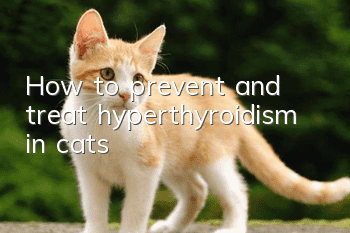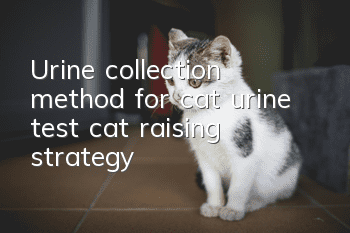How to prevent and treat hyperthyroidism in cats?

The thyroid is very important to animals. It is a gland that regulates secretion and metabolism in the body. Cats also have a thyroid gland, and cats also rely on the thyroid gland to regulate their endocrine. Its endocrine disorders can also lead to abnormal thyroid hormone secretion. When it If the thyroid gland is chemically stimulated or affected by tumors, will it be the same as people's, with increased appetite, as if they can't eat anything, and abnormal excitement, which is what we usually call hyperthyroidism? If so, what should be done? treatment, and how to prevent it in daily life?
Cats do get hyperthyroidism, but generally middle-aged and elderly cats are more likely to get hyperthyroidism. Middle-aged and elderly cats are cats between 4 and 22 years old. Hyperthyroidism is usually caused by benign hyperplasia of the thyroid gland. Benign hyperplasia of tumors can It can be controlled, but it will lead to thyroid secretion disorders, and a small part of it is caused by malignant tumors. Thyroid tumors are often bilateral and rarely metastasize.
Middle-aged and elderly cats have hyperthyroidism. The cats usually become very thin, but their appetite increases greatly. When the owner is eating, the cat will pester you for food on the table, or rub against you when the owner opens the refrigerator. Ankles, often excessive thirst, and some symptoms of needing to drink water. When a cat has hyperthyroidism, the cat will be very restless. It can't calm down, keeps moving, and will scream. Of course, this kind of scream is not the kind of scream when it is in heat, but a very shrill scream. sound. In addition, hyperthyroidism can cause various complications, such as toxic cardiomyopathy, renal insufficiency, systemic hypertension, or gastrointestinal diseases.
The probability of hyperthyroidism in young cats is very small, but we should not take it lightly. There are various factors that cause hyperthyroidism. We should pay attention to the cat’s diet and do not let the cat come into contact with rotten food. There are bacteria in rotten food. and fungi, which can cause endocrine disorders and are the main culprits of tumors. At the same time, we must also pay attention to hygiene, pay attention to the care of cats’ daily living environment, and do not abuse drugs. Experiments have shown that the abuse of some veterinary drugs can also lead to a high incidence of tumors. .
Most treatments for hyperthyroidism involve surgical removal of thyroid tumors. The anti-hyperthyroidism drug is generally methimazole, which is a white or light yellow crystalline powder. It has a slight odor, is easily soluble in water, ethanol or chloroform, and is slightly soluble in ether. Melting point 144-147℃. Methimazole is an antithyroid drug that inhibits peroxidase, prevents the oxidation of iodide ions, and inhibits the synthesis of thyroid hormones. Methimazole can be taken orally. It is rapidly absorbed from the gastrointestinal tract and then distributed throughout the body. However, it is concentrated in the thyroid gland, so it can continue to exert its biological effects in the thyroid gland for a long time.
Other oral medicines can also use sodium iodide, which is a colorless cubic crystal or white crystalline powder. It is odorless and tastes salty and bitter. Easily soluble in water, soluble in methanol, ethanol, acetone, glycerol, liquid ammonia and liquid sulfur dioxide. The aqueous solution is slightly alkaline. Iodine is the oldestAnti-hyperthyroidism drugs, large doses of iodine can inhibit the hydrolysis of thyroglobulin and reduce the amount of thyroid hormone released into the blood; it can also inhibit the organicization of iodine in the thyroid gland, but the effect is temporary. In addition, iodine also has the effect of opposing thyroid-stimulating hormone, reducing the blood supply of hyperactive glands, degenerating thyroid tissue, making the glands smaller and harder, and reducing the vascular network, which is conducive to surgical treatment.
- What should I do if my newly adopted kitten keeps meowing?
- How can a thin cat gain weight? Learn about the guide to weight gain for cats!
- What is the meaning of cats in China?
- How often do newborn kittens defecate?
- How long does it take for a kitten to grow up?
- Can cats eat pomelo?
- Be careful about parasites when adopting stray cats
- How to feed a newly weaned cat?
- Why does a kitten have a smelly mouth?
- Why is the cat vomiting and diarrhea and not eating? Beware of feline distemper and feline infectious peritonitis!



